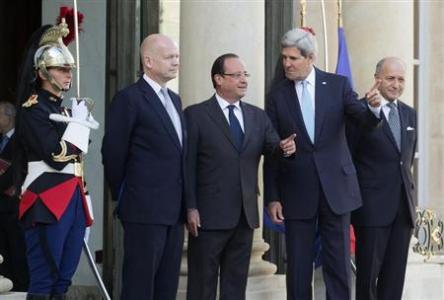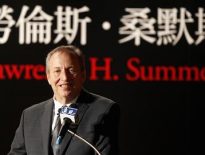(Reuters) – Bashar al-Assad’s chemical weapons bargain with Russia and the United States offers another political and military lifeline to the Syrian president, just two years after he was dismissed in Washington as a “dead man walking”.

The deal, reached under the shadow of threatened U.S. air strikes and only after the intervention of Syria’s ally Moscow, does come at a cost to the Syrian leader – a fact which likely explains the muted response in Damascus when it was announced.
By requiring Assad to surrender a chemical weapons arsenal which until last week his government had barely acknowledged, it would strip him of both a fearsome military advantage over rebels at home and his most potent deterrent to any further attacks by Syria’s enemy Israel.
But in the short term at least the Russian initiative, which Syria announced it would accept on the eve of the president’s 48th birthday last week, was a gift for Assad.
It lifts the immediate threat of U.S. military action and secures his government an indispensable role over the coming months in assisting the destruction of chemical stockpiles.
“You’re looking at a re-legitimized regime here. Not just Assad but the whole entourage,” said Ayham Kamel, an analyst at the Eurasia consultancy group. “For the foreseeable future the government of Syria has become the key interlocutor for the international community”.
Since the early months of Syria’s 2011 uprising, which has grown into a civil war in which 100,000 people have been killed, the United States has called on Assad to step aside. U.S., European, and Middle East foes have all predicted his imminent overthrow at various stages of the conflict.
“NO LEGITIMACY”
A U.S. official described Assad’s government in December 2011 as a “the equivalent of a dead man walking”, and the State Department insisted last week that the deal on chemical weapons did not change Washington’s position that he “has no legitimacy and can no longer be ruler of Syria”.
But however unpalatable the notion may be to President Barack Obama, only Assad and his officials can deliver the deal which U.S. Secretary of State John Kerry and Russia’s Foreign Minister Sergei Lavrov agreed out in Geneva on Saturday.
While Kerry said the destruction of Syria’s chemical weapons must be complete by the middle of next year, the tortuous U.N. disarmament of Iraqi chemical and biological weapons in the 1990s showed how long the process can stretch out.
U.S. officials believe Syria has 1,000 tons of chemical agents including mustard gas and nerve gases such as sarin, and have identified 45 sites they say are associated with the chemical weapons program.
Even if those sites are under the control of Assad’s army, Syria’s civil war will complicate the task of destroying the materials safely, providing plenty of room for delay even if Damascus is totally sincere in its commitment.
“We are at a very preliminary stage. Assad’s partial cooperation was prompted by the desire to deter an attack,” Kamel said. “It’s not clear that (cooperation) will be there in the future”.
“BACK TO BUSINESS”
The reprieve from U.S. military action has allowed Assad to strike back at rebels with forces which were briefly dispersed to avoid U.S. air strikes.
Activists and Damascus residents reported last week that his air force resumed bombardment of opposition strongholds around the capital, some of them close to the sites of the August 21 chemical attacks which prompted the threat of U.S. strikes.
“Essentially it’s back to business, continuing what the military was doing in the days before the chemical attack,” said Charles Lister, analyst at IHS Jane’s terrorism and insurgency centre in London.
“They are viciously suppressing pro-opposition areas around Damascus with artillery and air strikes. That means there is no longer the fear of Western punishment for anything the military may have done.”
Syria has denied U.S. allegations that its forces were responsible for last month’s chemical attacks around Damascus, and earlier suspected chemical incidents in the capital, Homs and the northern provinces of Aleppo and Idlib.
Assad’s opponents, who had hoped that the anticipated U.S. attacks would offer a platform for broader rebel offensives across the country, see the chemical bargain as a betrayal.
“A crime against humanity has been committed and there is no mention of accountability,” said Salim Idriss, head of the Western-backed Supreme Military Council which oversees a loose grouping of non-jihadist rebels known as the Free Syrian Army.
The shelving of U.S. military action is also a setback for Idriss’s regional backers, Saudi Arabia and Qatar. Riyadh had called for a “decisive and serious” stand against Assad.
But the president’s close ally Iran, which has provided economic and military assistance to his government, quickly welcomed the chemical weapons initiative.
Lister said Idriss’s despair should be a warning for his Western and Arab backers, who hope that the fractured FSA rebels can emerge as a counterweight to the growing strength of radical Islamists and al Qaeda-linked fighters.
Idriss’s limited influence over the FSA brigades stems from his position as a conduit for outside support.
“There have been questions about his control over the so-called ‘moderate opposition’,” Lister said. “If he does have any control, large portions will now look at him and his perceived ability to attract Western backing as significantly weaker than was the case a few days ago.”
“What has happened now is a Russian and U.S. deal that legitimizes the al Qaeda line that the West acts only in its own interests and won’t intervene unless it suits those interests.”
NO TRIUMPHALISM
In the first government comments following Saturday’s U.S.-Russian announcement, Syrian minister Ali Haidar described the chemical deal as a victory for Syria.
But most Syrian officials, including Assad himself, have been more muted in their response, perhaps reflecting unease that Damascus had found itself renouncing overnight a strategic arsenal it has stockpiled for decades.
Syria had always said that any move to abandon weapons of mass destruction should apply to all countries in the region including Israel, long believed to be the only nuclear-armed Middle East nation.
Foreign Minister Walid al-Moualem gave only a brief and subdued statement in Moscow last week when he first declared Syria’s welcome for the Russian initiative.
Assad showed no sign of triumph when he told a Russian television interviewer on Friday that he agreed to the proposal to prevent the United States from launching a “regional war”.
The interview was Assad’s third in a week with foreign media but he has not addressed Syrians directly on the issue.
“They are not boasting too much, because they had to make an extremely significant concession by offering to destroy the chemical weapons – although I’m skeptical it will work out at as a successful deal,” Lister said.
But in the meantime “they will have received a big boost in terms of confidence”.
(Editing by Giles Elgood)





